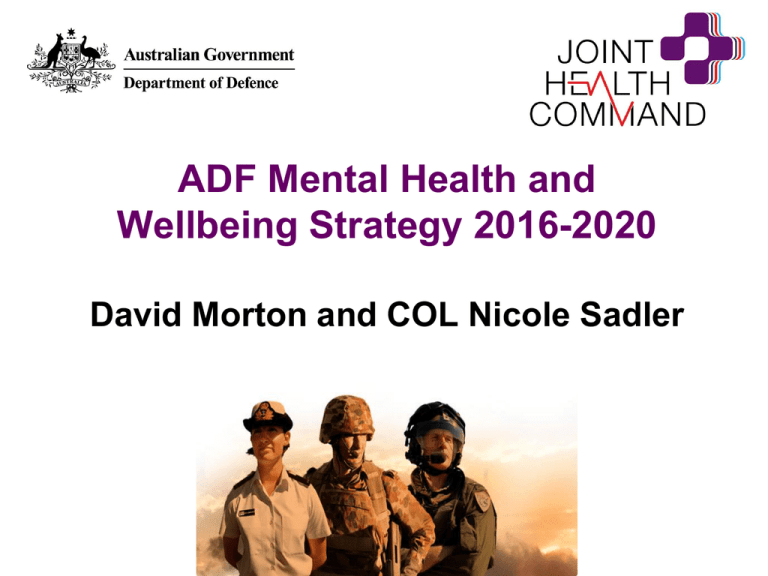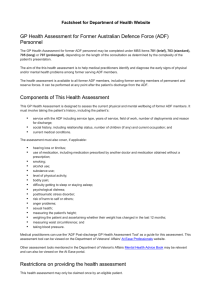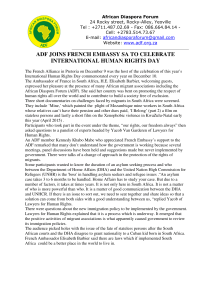ADF Mental Health and
advertisement

ADF Mental Health and Wellbeing Strategy 2016-2020 David Morton and COL Nicole Sadler 2011 ADF Mental Health & Wellbeing Strategy • 2002 ADF Mental Health Strategy • 2009 Dunt Review • Four year ADF Mental Health Reform program • 2010 ADF Mental Health Prevalence and Wellbeing Study • 2011 ADF Mental Health and Wellbeing Strategy • ADF Mental Health and Wellbeing Action Plan (2012-2015) Strategic Objectives 1. Promote and support mental fitness within the ADF Priority Actions 2. Identification and response to mental health risks of military service Address stigma and barriers to care Strengthen mental health screening continuum Improve pathways to care Develop e-mental health approaches Develop comprehensive peer support network 3. Delivery of comprehensive, coordinated, customised mental health care Improve pathways to care Enhance service delivery Upskill service providers 4. Continuously improve the quality of mental health care 5. Building on evidence base about military mental and wellbeing 6. Strengthening strategic partnerships and strategic development Strengthen mental health screening continuum Enhance service delivery Key Achievements • Invested over $162.5 million on services and support • Increased the mental health workforce • Improved access to mental health care – – – – Regional Mental Health Teams Mental Health Integration Project Support to Wounded, Injured and Ill Program (SWIIP) Simpson Assist Programs • Strengthened resilience training & prevention strategies – – – – – Suicide Awareness program ADF Alcohol Management Strategy BattleSMART Keep Your Mates Safe Annual ADF Mental Health Day ADF Mental Health Videos Key Achievements • Improved policy and training for ADF mental health professionals • Established the ADF Centre for Mental Health • Department of Veterans’ Affairs/ADF MOU • Research Alliances • E-Mental Health – SmartPhone apps – Portal Key Reforms Still Being Actioned • Continuous improvement – evaluation of mental health programs • Full implementation of Mental Health Integration Project • Research Programs – – – – Transition and Wellbeing Research Programme LASER-Resilience Role of families in rehabilitation Military Rehabilitation and Compensation Act (MRCA) Longterm study – study design framework • Mental Health Screening Continuum Development of MHWS 16-20 • Initial consultations – Mental Health Advisory Group – Joint Health Command – Single Service Director General of Health and Director of Health – Command team representatives – CDF Leadership Forum – Australian Command and Staff College – Defence Reserve Support Council – Army Mental Health Conference – Navy Capability Committee Agreed MHWS 16-20 Concept • Consolidate achievement under current Strategy and align with national approaches • Align with ADF personnel initiatives and cultural reviews – focus/accountability beyond health • Shared responsibility between individuals, commanders and health providers • Include spirituality and wellbeing concepts • Improve communications strategy • Include the continuous improvement framework for mental health programs • Action Plan to include JHC and single Service components Development of MHWS 16-20 • Mental Health Working Group meetings – Draft strategy and action plans, communication strategy and governance structure • Consultation on first draft, including with Mental Health Advisory Group, Senior Leadership Group • Consultation on second draft – ADF members/commanders, other Government Departments, Australian Medical Association, community organisations, general public • Finalisation of document for early 2016 release Key Considerations 2016-2017 • Senate Inquiry Mental Health of Serving ADF Personnel – Release of findings in Feb 16 • Outcomes of the Transition and Wellbeing Research Programme • National mental health policy and government direction Questions?



